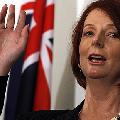
Kevin Rudd was dramatically ousted as Prime Minister this week. After a period of sinking popularity and public discontent, Rudd became the first Labor prime minister ousted before completing a first term.
Initially Rudd had said that he would stare down any threat to his leadership. But with right-wing Labor Party power brokers working frantically to secure support for a challenge from deputy leader Julia Gillard, Rudd lost the numbers needed to maintain leadership.
In the end Rudd chose to stand down, leaving the way for Julia Gillard to become Australia’s first female PM.
The leadership spill was brought on by two significant factors. The first was economic concerns within the ruling class. Despite the rhetoric in the mainstream press, most bosses very aware of the dangers that face the Australian economy.
While many were happy with the stimulus measures Rudd initially introduced, the situation has now moved on. The massive amounts of debt now have to be paid back. Employers are not prepared to sacrifice their profits, and as such want working people to carry the burden. The ruling class wants a leader that can successfully introduce harsh austerity measures.
In the opinion of many bosses Rudd was not moving quickly enough to rein in spending and implement cuts. At the same time opposition leader Tony Abbott is considered too unskilful and too crude to implement austerity measures without sparking resistance from workers and their unions.
Gillard, on the other hand, has a record of being a steely operator. Since becoming Deputy PM she has stared down teachers who were threatening strike action and told construction workers to expect no changes to the draconian laws that affect their industry. For the bosses, Gillard is best suited to represent their interests.
The second significant factor that led to the spill was that many ordinary people had lost faith in Labor after a series of policy back flips. In opposition Rudd said that he would act on climate change. While his emissions trading scheme would have been inadequate, he ditched this proposal and replaced it with nothing. This disappointed millions of people who want to see real action to stop global warming.
More recently Rudd had pushed the resources super-profits tax. This tax angered many mining companies and they responded with a mass propaganda campaign. The campaign, which has been backed by the opposition, claimed the tax would do damage to the economy. Many workers and even some Labor MPs started to question Rudd’s economic credentials.
The mining companies (perhaps more than the government) understand that many workers are concerned about job security. In a dishonest fashion, they tried to confuse workers and have exploited the mood of insecurity in order to undermine Rudd and push their own profit making agenda.
Rudd was clearly loosing the public debate on the mining tax. Despite his claims that Australia’s resources should be shared by everyone, he was unable to explain how the tax will benefit ordinary people.
The reality is that the tax will not benefit workers. It will mainly be used to reduce the level of corporate tax paid across all industries and to finance infrastructure for the mining companies themselves. Gillard has now “opened the door” to the mining bosses indicating that she may make concessions to the companies.
In general terms, Rudd lost the confidence of the ruling class and disappointed those who voted him in. With the federal election due to be called in the coming months the Labor Party are hoping a new leader will give them a much needed boost.
The problem for workers is that while Gillard has replaced Rudd, nothing has replaced the Labor Party’s right wing policies. Since Labor was elected to office in 2007 the Socialist Party has explained that they would carry out a similar program to their Liberal predecessors. Just like the Liberals, Labor is a party that puts the interests of big business first. This will be the case regardless of who leads the party.
The lead up to the federal election is bound to be filled with many more twists and turns, but regardless of whether Labor or the Liberals win, both will have the same plan. Like all capitalist governments around the world they will be looking to make ordinary people pay for the economic crisis. The challenge for workers and young people will be to campaign against this plan and to build a new party that is not wedded to big business and puts the interests of ordinary people first.
Special financial appeal to all readers of socialistworld.net |
Support building alternative socialist media Socialistworld.net provides a unique analysis and perspective of world events. Socialistworld.net also plays a crucial role in building the struggle for socialism across all continents. Capitalism has failed! Assist us to build the fight-back and prepare for the stormy period of class struggles ahead. Please make a donation to help us reach more readers and to widen our socialist campaigning work across the world. |
Donate via Paypal |
| M | T | W | T | F | S | S |
|---|---|---|---|---|---|---|
| 1 | 2 | 3 | 4 | 5 | 6 | |
| 7 | 8 | 9 | 10 | 11 | 12 | 13 |
| 14 | 15 | 16 | 17 | 18 | 19 | 20 |
| 21 | 22 | 23 | 24 | 25 | 26 | 27 |
| 28 | 29 | 30 | ||||


Be the first to comment